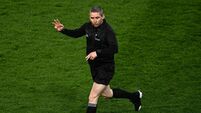Patrick Kelly: An age-old problem persists as Cork run aground

LOTS TO WORK ON: Colm O'Callaghan of Cork in action against Meath players Ronan Jones, right, and Cathal Hickey as Mathew Costello, far left, looks on during the Allianz Football League Division 2 match between Cork and Meath at Páirc Ui Chaoimh. Pic: Piaras Ó Mídheach/Sportsfile
COMING into Sunday’s Division 2 opener, I would have felt that it was a league-defining game for the Cork footballers.
A win and I felt there would be an outside chance of promotion, but more importantly, relegation fears would become distant. Defeat, however, and we now face the real prospect of being pointless after three league games with Kildare away and Dublin at home coming down the tracks.









